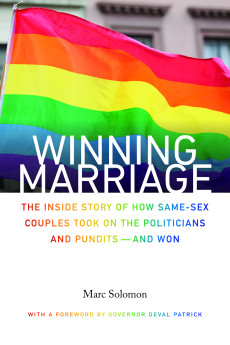
WINNING MARRIAGE: The Inside Story of How Same-Sex Couples Took on the Politicians and Pundits - and Won
Marc Solomon
368 pages, ForeEdge, 2014
That morning, New England Cable News (NECN) called me and asked if I’d provide live commentary as the decision came in. For the past three years, I had been an active volunteer and, during one intensive period, a paid lobbyist, for the Massachusetts Freedom to Marry Coalition, a grassroots group advocating for marriage for same-sex couples. I was thirty-seven years old, living in Boston, and finishing up a mid-career master’s degree at Harvard’s Kennedy School. I had made my way to school early that morning to complete an assignment and was wearing a flannel, black-checked shirt. I wanted to go home to change, but there wasn’t time, so flannel it would be. I got into a taxi in Harvard Square for the ten-mile ride to their Newton studio. As my taxi pulled up right at ten o’clock, I called Gavi Wolfe, GLAD’s public education staffer, to find out what the ruling was.
Hold on, he told me. Mary Bonauto was flipping through the decision at the courthouse, and they were waiting.
I waited, butterflies fluttering in my stomach.
It’s a win, Gavi said excitedly.
What’s that mean? I asked. A full win?
A full win. Same-sex couples would be able to marry in Massachusetts. I walked into the NECN headquarters and was whisked into the studio, wired up, and then directed to join the anchors who were reporting live on the decision. They were confused about what it meant. Did it mean marriage, or could Vermont-style civil unions suffice? I said that, while I hadn’t read the opinion, I understood it to be full marriage for same-sex couples, for the first time ever in American history.
Statements from political leaders across the spectrum began pouring into the newsroom. The anchors literally pulled them off the fax or wire and asked me to comment. I knew that opposition would be fervent, though the rapidity of response from some of the most powerful forces in the country was jarring. The White House immediately released a statement from President George W. Bush, who was gearing up for his reelection campaign: “Marriage is a sacred institution between a man and a woman. Today’s decision of the Massachusetts Supreme Judicial Court violates this important principle. I will work with congressional leaders and others to do what is legally necessary to defend the sanctity of marriage.”
Massachusetts Governor Mitt Romney responded with similar resolve. “I agree with 3,000 years of recorded history,” he said. “I disagree with the Supreme Judicial Court of Massachusetts. Marriage is an institution between a man and a woman. Our Constitution and laws should reflect that,” said the governor, who by the day was tacking to the right as he geared up for a possible presidential run.
Religious right groups jumped into the fray, predicting apocalyptic consequences. Dr. James Dobson, who headed up Focus on the Family, the largest religious right organization in the country with a $130 mil- lion annual budget, said in a statement, “The dire ramifications of what is happening in the United States and other Western nations cannot be overstated.” The Catholic hierarchy, which until the recent sex scandal had near veto power over legislation in Massachusetts—the second most Catholic state in the country after Rhode Island—was apoplectic. Former Boston mayor and US ambassador to the Vatican Raymond Flynn, who served an informal mouthpiece for the church in Massachusetts, called the issue “a ticking time bomb in America for the last several months that has exploded in Massachusetts.”
What was especially painful was that from those who were normally sympathetic to gay rights on the national level, we heard mostly silence or tortured attempts to rationalize their opposition. Dick Gephardt, the former Speaker of the House of Representatives from Missouri and then a long-shot candidate for president, spoke out in opposition to the ruling, in spite of the fact that he had a lesbian daughter. Our own senator, John Kerry, who was locked in battle with Howard Dean for the Democratic presidential nomination, reiterated his opposition even while trying to sound positive: “I have long believed that gay men and lesbians should be assured equal protection and the same benefits—from health to survivor benefits to hospital visitation—that all families deserve. While I continue to oppose gay marriage, I believe that today’s decision calls on the Massachusetts State Legislature to take action to ensure equal protection for gay couples.”
The only statement the anchors read to me from an elected official that was 100 percent supportive was from openly gay Massachusetts Congressman Barney Frank. The decision, said Frank, “will enhance the lives of probably thousands, maybe tens of thousands, of Massachusetts citizens, and will have no negative effects on anyone else.”
That night, the Freedom to Marry Coalition, GLAD, and numerous other groups in support of the freedom to marry that had formed a loose coalition called MassEquality held a huge rally at Boston’s Old South Meeting House, the historic Quaker house of worship where in 1773 the Boston Tea Party was organized. It had served as a hub of rebellion for many years, from abolitionism to pro-Union organizing during the Civil War.
We reveled in the decision.
“The day in Massachusetts when same-sex couples could be excluded from the institution of civil marriage is over,” proclaimed GLAD’s executive director Gary Buseck to an enormous roar. Couples were singing, “Going to the State House and we’re going to get married.” The building was electric, the joy palpable, and the cheers raucous; a new freedom movement was gaining strength.
Excerpt from WINNING MARRIAGE: The Inside Story of How Same-Sex Couples Took on the Politicians and Pundits—and Won by Marc Solomon published by ForeEdge, an imprint of University Press of New England. Used with permission.

